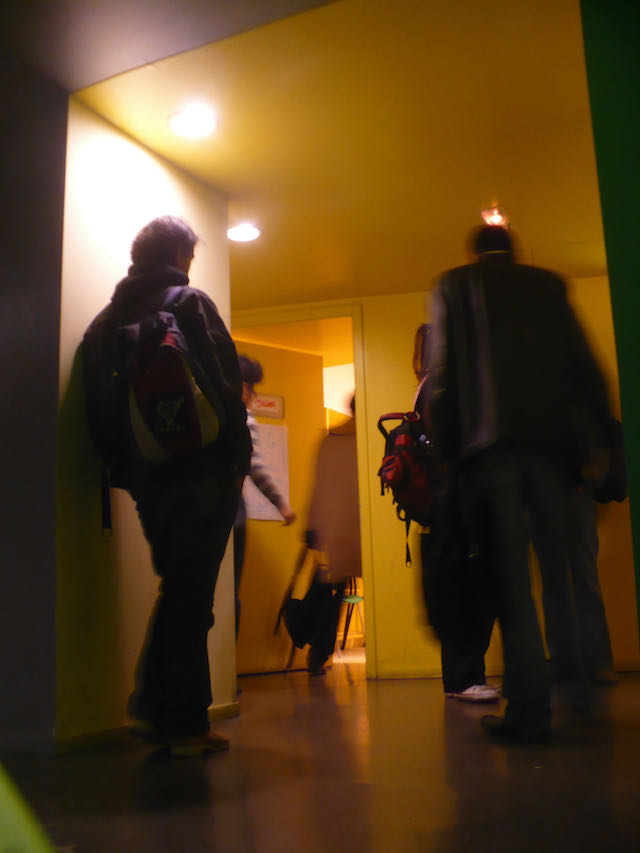A senior figure like Douailler had a privileged view of the Philosophy Department, and it is worth considering how he theorized the space. By virtue of his role, he was often asked to become a spokesman for his institution, and to evoke a dignified image thereof. He was asked to make the institution recognizable, marketable and presentable, to conceal its crises and emphasize its functions. When Douailler described the Department’s future to me as it seemed in 2010, he reformulated his image of philosophy in what I might call “dignified radical” terms.
The question of the future that you’re bringing up strikes me as a good one. The future doesn’t appear with the same figure and in the same forms as in the seventies. That’s clear […] The meaning of the future would be an other world, the way in which another world could appear on the horizon. In 1970, the idea was that the future was in revolts, in social inventions dealing with feminism, with the struggles of prisoners…
There was a feeling that, within all that, a future could appear on the horizon. So, today, maybe it’s still a question of the future, but now the future is reformulated in terms of the absolute necessity of any world other than this one. It gets framed in a quite empirical manner and with a very basic conception of time: it will be in a future, in a time to come, but it’s a weak notion of the future. And it applies to the question of the students that you’re raising, right?
Douailler went on to describe the way the future appeared to the students:
I think all of these [student] groups will at least agree on what we were just saying. That is: that they’re finding a door towards a thing [une porte envers une chose]. You can even call it a future. With the feeling that, coming here, they won’t even start out with the theoretical tools — we wouldn’t know how to give them any because, well, you don’t necessarily know what works the best, you can’t say that it’s Foucault who will work best, that it’s Deleuze who will work the best. We no longer know what the right curriculum is, you know. But on the other hand, they know they have a space to decide for themselves. As a space to offer them, it’s pretty weak, but for many of them, it’s already a start.
Thus even if the department attracted some politically active students, the future it could offer had become more diffuse, more abstract, converging with the empty altermondialisation slogan, “Another world is possible.” The post–1970s future — in this moment of neoliberal globalization and looming ethnonationalist backlash — was a future without content: if radical philosophy’s future amounted to a “door towards a thing,” then neither the door nor the thing were well-defined terms.

This vagueness encoded a politics and a strategy. By not dictating the students’ future, Douailler was arguing, the department was refusing to impose any imperialistic pedagogy, refusing to claim to know what kind of knowledge was best for the students. It was as if the “space to decide for themselves,” in an otherwise routinized and neoliberalizing university system, was the most utopian thing the department could offer. What Douailler codified was an alternative form of an institution, to be sure. He envisioned a philosophical institution without curriculum in a field where the curriculum [le programme] had historically been very strict (Pinto 2007; Fabiani 1988, 1983). He endorsed a form of non-hierarchical self-teaching in a university system that had long fixated on the professor’s magisterial radiance. This went along with his strong sense of philosophy’s decline as a discipline.
From their [sociological] point of view, the situation is grave, in the sense of a future prognosis. After all, we’re in a period where the whole set of schemas that asserted that philosophy still had a kind of prestige, had its codes, that it was classy to do philosophy, leading to certain careers, like diplomacy or culture — all that has collapsed. What the sociologists could observe today is a frightening collapse of those who held onto a certain doxa of distinction about philosophy and things of that order. They can show it in the statistics, apparently. For first year [undergraduates], major universities like Nanterre or Strasbourg are enrolling four or five students. Which means that — it’s terrifying. If there weren’t a body of students from the Third World, I mean, or from emerging continents — it’s over. It’s over, meaning that the idea that philosophy is a subject with any real draw, or that is really central to culture — in some places it’s declining, or is going to disappear.
As the national market for philosophy seemed to collapse, the postcolonies (termed “emerging continents”) seemed to offer a solution, or at least a deferral of the end of philosophy. And in the face of this collapse, Douailler set himself to formulate an institution. He dignified his department with a theory of an egalitarian pedagogy that just happened to spare the teaching staff from having to determine a definite curriculum. His stance here was arguably reparative about an institution that he also knew to be hollow, fractured, and torn, a department of “frenzied individualism” without a clear curriculum. Yet his reparative image of a “door towards a thing” also tended to resolve ambivalence into something provisionally affirmative.